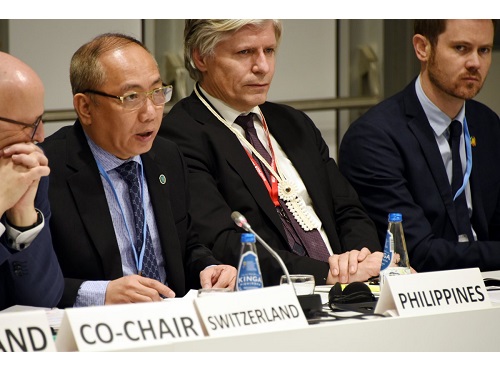
December 15, 2018 Saturday

KATOWICE, POLAND 15 December 2018 – Curbing air pollution and improving public health can drive broader climate action, Secretary Emmanuel De Guzman of the Climate Change Commission said during the 10th High Level Assembly of the Climate and Clean Air Coalition (CCAC) here during the two-week United Nations climate change conference.
Secretary De Guzman, who leads the Philippine delegation to the climate talks and, at the same time, a member of the Steering Committee of the CCAC, lauded the Action Programme of the CCAC presented at the high-level assembly calling for “enhanced ambition to rapidly reduce short-lived climate pollutants and to ensure that mitigation efforts are integrated in order to address air pollution and climate change.”

The Action Programme also recognizes that action taken in the next decade is crucial if the world is to achieve the Paris Agreement’s 1.5 degrees Celsius temperature goal.
CCAC is a partnership of 61 governments, 17 intergovernmental organizations, 54 non-government organizations including businesses and scientific institutions. Short-lived climate pollutants such as methane, black carbon, hydrofluorocarbons and tropospheric ozone, have powerful effect on global temperatures.
“We join the Coalition on these climate actions that could avoid an estimated 2.4 million premature deaths from outdoor air pollution annually by 2030, prevent annual crop losses by as much as 52 million tons, avoid global warming by as much as 0.6°C by 2050,” Secretary De Guzman said citing the newly-released report of the World Health Organization in Katowice during the climate talks.
The WHO report singles out two short-lived climate pollutants with greatest impact on climate change and health, black carbon and methane.
He said that climate change should be seen as “an urgent public health issue” as it pose a major health threat to people due to worsening air pollution and illnesses indicated in the WHO report.
Secretary De Guzman added that the Action Programme could prevent climate tipping points that exacerbate long-term climate impacts and make climate change adaptation harder and sustainable development more elusive, especially for the poor and vulnerable nations like the Philippines.
“Philippines stands strongly committed to reduce short-lived climate pollutants (SLCPs),” Secretary De Guzman said, adding that Philippines supports the CCAC and the collective global actions that could reduce methane emissions by 25 percent and black carbon by 75 percent, as well as to eliminate hydrofluorocarbons in the next 25 years.
Secretary De Guzman said the Philippines have included reducing SLCPs in the national planning process as well as in our system for measurement, reporting and validation (MRV) for carbon emissions.
The Philippines, he said, will continue to strive to improve air quality with the full implementation of the Philippine Clean Air Act of 1999 with a goal to achieve and maintain air quality that meets the national air quality guidelines for criteria pollutants and their emissions standards.
He further said Philippines has step up efforts in adopting the Euro 6 fuel and vehicle standards and the rapid deployment of electric vehicles; maximizing energy efficiency as countries phasedown HFCs, as well as a systems approach to cooling and heating; enhancing mitigation measures for emissions from agriculture; shifting to renewable energy to meet the demands and contribution to the global effort of limiting global warming below 1.5 degrees Celsius.
“We shall scale up our climate actions in all sectors, through a whole-of-society-and-government approach. This we shall pursue with a robust strategy for climate financing, technology development and transfer, and capacity building. We shall fast-track these climate actions through the support of our development partners,” De Guzman said.